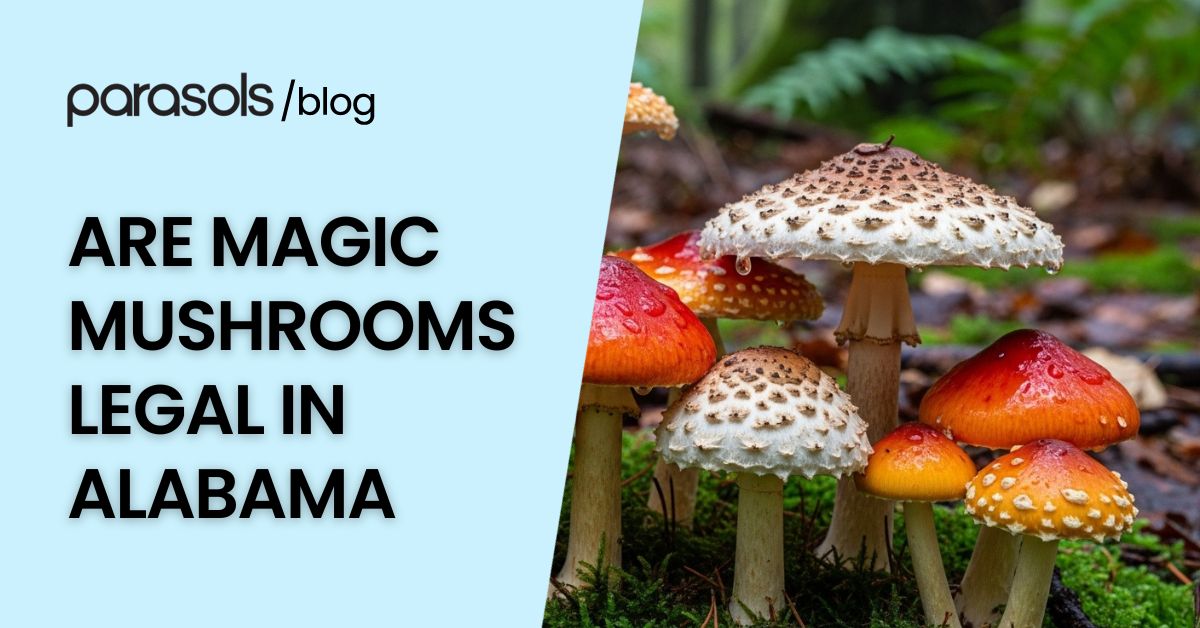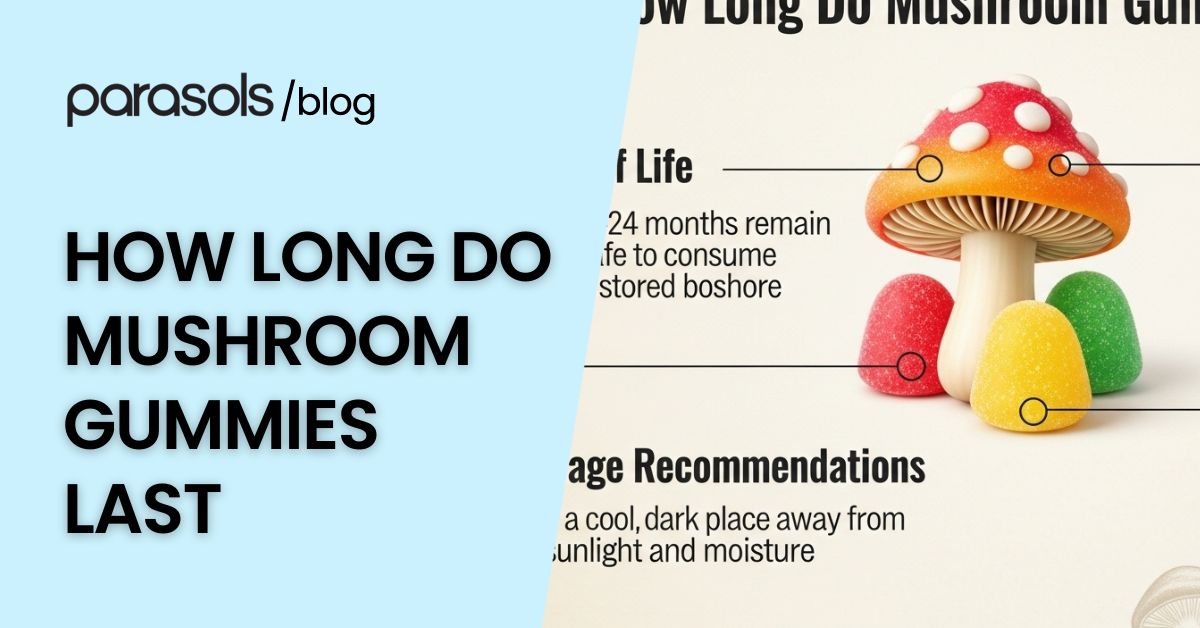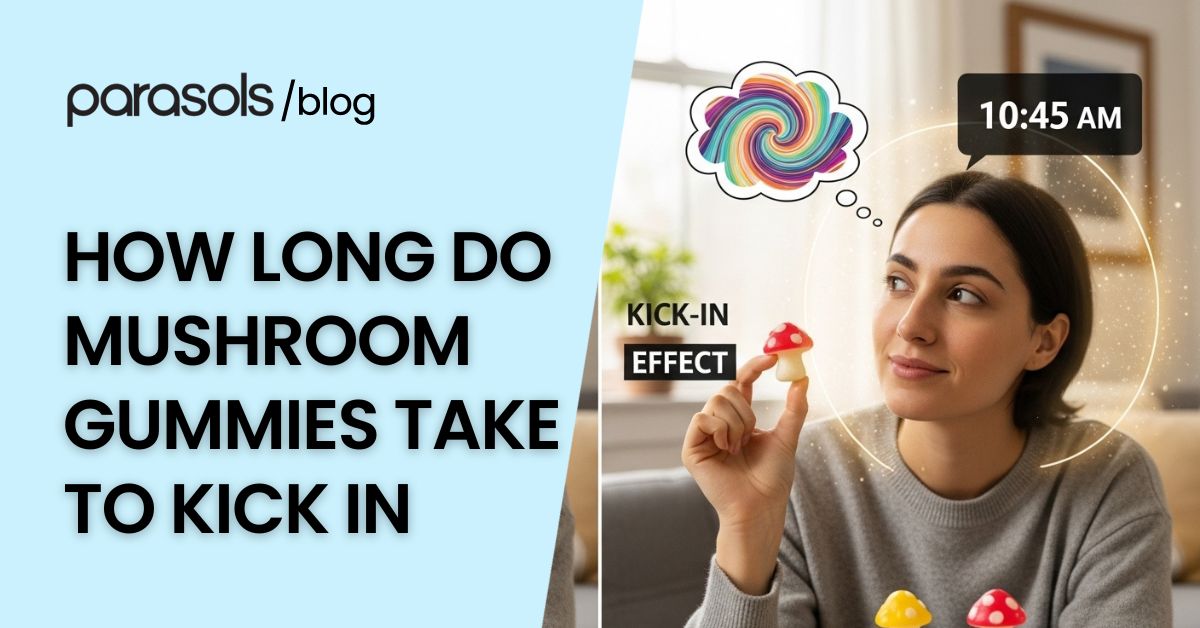Magic mushrooms, known for their psychoactive properties due to the compound psilocybin, have gained attention for their potential therapeutic benefits in mental health treatment. However, their legal status varies widely across the United States. Many people have been asking, are magic mushrooms legal in Alabama?
Here's what Alabama residents need to know about the current legal status, laws, and regulations surrounding magic mushrooms in the state. If you live in a state where they are legal, parasols offer high quality and safe mushroom gummies like our wildberry non detect shroom gummies.
Are Magic Mushrooms Legal in Alabama?
No, magic mushrooms are illegal in Alabama. Psilocybin, the active compound in these mushrooms, is classified as a Schedule I controlled substance under both federal law and Alabama Code § 20-2-23. This classification indicates that psilocybin has a high potential for abuse and no accepted medical use.
Possession, sale, or cultivation of psilocybin mushrooms is considered a Class D felony in Alabama, punishable by 1 to 5 years in prison and fines up to $7,500. Distributing magic mushrooms carries even harsher penalties, with sentences ranging from 2 to 20 years in prison.
Why Are Shrooms Illegal in Alabama?
Magic mushrooms are illegal in Alabama primarily due to their classification as a controlled substance. State and federal laws consider psilocybin, the psychoactive compound in these mushrooms, to pose serious risks without recognized medical use. Here are the main reasons behind their illegal status:
- Schedule I Classification: Psilocybin is listed under the federal Controlled Substances Act and Alabama Code Title 20 as a Schedule I controlled substance.
- No Accepted Medical Use: Lawmakers cite the lack of officially accepted medical use despite emerging psychedelic research.
- High Potential for Abuse: Psilocybin mushrooms are seen as substances with a high risk for misuse, based on historical legal frameworks.
- Mental Health Concerns: Concerns about adverse effects on brain function and the potential for triggering psychiatric conditions contribute to the legal restrictions.
- Strict State Laws: Alabama maintains some of the strictest laws on psychedelic substances, classifying possession as a Class D felony.
- Federal Influence: Federal law heavily influences state policy, and psilocybin remains illegal at the federal level despite growing public opinion in favor of change.
Consequences of Magic Mushroom Possession in AL

Possessing magic mushrooms in Alabama carries serious legal consequences due to the state's strict drug laws. Offenses related to psilocybin mushrooms are treated harshly under both state and federal law, regardless of intent or quantity.
Criminal Classification
Magic mushrooms are considered a Schedule I controlled substance under Alabama law. This means they fall into the same category as LSD and heroin, with no accepted medical use and a high potential for abuse. Possession, cultivation, or sale of psilocybin mushrooms is illegal and classified as a felony offense.
Penalties for Possession
Being caught with psilocybin mushrooms can lead to a Class D felony charge. This may result in:
- 1 to 5 years in prison
- Fines up to $7,500
- A permanent criminal record
The severity increases with the amount possessed and whether the intent is for personal use or distribution.
Penalties for Distribution or Trafficking
Distributing magic mushrooms—or possessing them with intent to distribute—is considered more serious. These charges may lead to a Class B felony, which carries:
- 2 to 20 years in prison
- Substantially higher fines
- Harsher scrutiny from law enforcement agencies
Impact on Future Opportunities
A felony conviction for magic mushroom possession can affect employment, housing, education, and even voting rights. It also disqualifies individuals from professional licenses and some government benefits.
Law Enforcement Prioritization
While some jurisdictions nationwide are shifting toward decriminalization, Alabama maintains a tough stance. Magic mushroom laws remain actively enforced, with no current legal alternatives or provisions for psychedelic assisted therapy within state law.
What are Legal Alternatives to Magic Mushrooms in AL?
While psilocybin mushrooms remain illegal in Alabama, some legal alternatives are being studied for their potential therapeutic benefits. These substances may offer similar effects in mental health treatment under proper guidance and legal use.
- Ketamine Therapy: Legally available in clinical settings for treatment-resistant depression and other mental health conditions. It is not classified as a Schedule I drug and is approved for medical use under federal law.
- Amanita Muscaria: This mushroom is legal in most states, including Alabama, because it contains muscimol—not psilocybin. Though it produces psychoactive experiences, it acts differently on the brain and should be used with caution.
- Psilocybin Mushroom Spores: While the mushrooms themselves are illegal, psilocybin spores may be sold legally in Alabama for microscopy and research purposes—though cultivation remains a felony.
- CBD and Hemp-Derived Products: Fully legal under federal and Alabama state law, these substances offer calming and mood-stabilizing effects and are widely accessible.
- Supplements That Support Brain Function: Natural nootropics like lion’s mane mushroom, L-theanine, and ashwagandha are legal and used to support cognitive health and emotional balance.
- Psychedelic Alpha or Synthetic Analogues (Where Legal): Some labs are researching non-psilocybin compounds that mimic psychedelic effects while staying within legal bounds. These are experimental and not yet widely available.
These alternatives should be used with guidance from medical professionals, especially when treating conditions like depression or anxiety.
Final Thoughts

In Alabama, magic mushrooms remain strictly illegal, with severe legal consequences for possession or distribution. While interest in their therapeutic potential continues to grow, current laws reflect a cautious stance shaped by federal policy and public safety concerns. Until Alabama laws change, those interested in mental health support should explore safe, legal alternatives and consult qualified professionals for guidance.
Frequently Asked Questions
Can I legally grow magic mushrooms at home in Alabama?
No, cultivating psilocybin mushrooms is illegal in Alabama and considered a felony offense, regardless of whether it’s for personal or non-commercial use.
Are there any ongoing efforts to decriminalize magic mushrooms in Alabama?
As of now, there are no active decriminalization or legalization efforts for magic mushrooms in Alabama. The state maintains a strict stance, and psychedelic legalization movements have not gained traction locally.
Is it legal to possess magic mushrooms for religious or spiritual use?
No. Alabama law does not recognize religious or spiritual use as a valid defense for possessing or using psilocybin mushrooms.
What happens if I’m caught with a small amount of magic mushrooms?
Even small amounts can lead to a Class D felony charge, resulting in potential prison time, fines, and a permanent criminal record.
Can psilocybin be prescribed by doctors in Alabama?
No. Psilocybin is a Schedule I controlled substance and has no accepted medical use under Alabama or federal law, so it cannot be legally prescribed.
Are clinical trials involving psilocybin available in Alabama?
Currently, there are no approved psilocybin clinical trials operating in Alabama. Interested individuals would need to travel to other states or participate in federally sanctioned studies elsewhere.
Are other psychedelics treated the same way in Alabama?
Yes. Substances like LSD, MDMA, and DMT are also classified as Schedule I controlled substances in Alabama, carrying similar legal penalties for possession or distribution.



Leave a comment
This site is protected by hCaptcha and the hCaptcha Privacy Policy and Terms of Service apply.